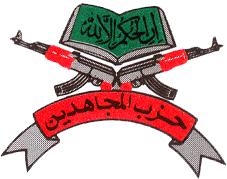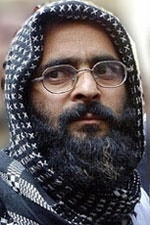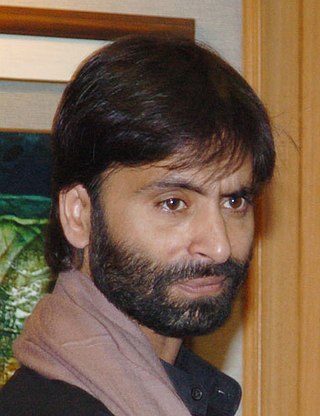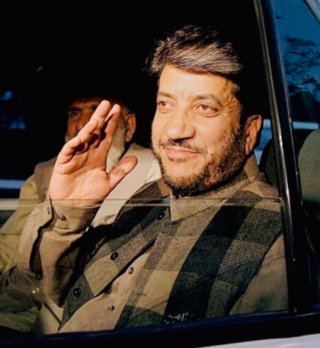Related Research Articles

Hizbul Mujahideen, also spelled Hizb-ul-Mujahidin, is a Pakistan-affiliated Islamist militant organisation that has been engaged in the Kashmir insurgency since 1989. It aims to separate Kashmir from India and merge it with Pakistan, and is thus one of the most important players in the region as it evolved the narrative of the Kashmir conflict by steering the struggle away from nationalism and towards jihadism.

The insurgency in Jammu and Kashmir, also known as the Kashmir insurgency, is an ongoing separatist militant insurgency against the Indian administration in Jammu and Kashmir, a territory constituting the southwestern portion of the larger geographical region of Kashmir, which has been the subject of a territorial dispute between India and Pakistan since 1947.

Mohammad Afzal Guru was a terrorist who was convicted for his role in the 2001 Indian Parliament attack. He received a death sentence for his involvement, which was upheld by the Indian Supreme Court. Following the rejection of a mercy petition by the President of India, he was executed on 9 February 2013. His body was buried within the precincts of Delhi's Tihar Jail.

Yasin Malik is a Kashmiri separatist leader and former militant who advocates the separation of Kashmir from both India and Pakistan. He is the chairman of the Jammu Kashmir Liberation Front, which originally spearheaded armed militancy in the Kashmir Valley. Malik renounced violence in 1994 and adopted peaceful methods to come to a settlement of the Kashmir conflict. In May 2022, Malik pleaded guilty to charges of criminal conspiracy and waging war against the state, and was sentenced to life imprisonment.
Mohammad Yusuf Shah, commonly known as Syed Salahuddin, is the head of Hizbul Mujahideen, a terrorist organization operating in Kashmir. He also heads the United Jihad Council, a Pakistan-based conglomeration of jihadist militant groups sponsored by the ISI, with the goal of merging Jammu and Kashmir with Pakistan.
Asiya Andrabi is a Kashmiri separatist and founding leader of Dukhtaran-e-Millat. This group is part of the separatist organisation All Parties Hurriyat Conference in the Kashmir valley. Government of India has declared it as a "banned organization". The organisation claims that it aims for the freedom of Kashmir from India.

Mohammad Farooq Shah commonly known as Mirwaiz Moluvi Mohammad Farooq was the Mirwaiz of his time in Kashmir—north of India— and chairman of All Jammu and Kashmir Awami Action Committee, a coalition of disparate political parties in Jammu and Kashmir that sought resolution of the Kashmir conflict.

Hashim Qureshi is a pro-Kashmiri leader and one of the founding members of Jammu Kashmir Liberation Front (JKLF) and is now the Chairman of Jammu Kashmir Democratic Liberation Party (JKDLP), one of the main Kashmiri political organisations.

The 2010 Kashmir unrest was a series of violent protests and riots in the Kashmir Division and Chenab Valley and Pir Panjal regions of Northern Jammu division of Jammu and Kashmir, India which started in June 2010 after the Indian Army claimed to have killed three Pakistani infiltrators in which a soldier of the Territorial Army, a counter-insurgent and a former special police officer had found three young men from their Nadihal village in Baramulla district and killed them in a "staged" encounter at Sona Pindi. The protests occurred in a movement launched by Hurriyat Conference led by Syed Ali Shah Geelani and Mirwaiz Umar Farooq in the Indian state of Jammu and Kashmir in June 2010, who called for the complete demilitarisation of Jammu and Kashmir. The All Parties Hurriyat Conference made this call to a strike, citing human rights abuses by security forces. Rioters shouting pro-independence slogans, defied curfew, attacked riot police with stones and burnt vehicles and buildings. The protests started out as anti India protests but later were also targeted against the United States following the 2010 Qur'an-burning controversy. The riot police consisting of Jammu and Kashmir Police and Indian Para-military forces fired teargas shells rubber bullets and also live ammunition on the protesters, resulting in 112 deaths, including many teenagers and an 11-year-old boy. The protests subsided after the Indian government announced a package of measures aimed at defusing the tensions in September 2010.

Shabir Ahmad Shah popularly known as Shabir Shah, in Kadipora, Anantnag, Kashmir is the founder and president of the Jammu and Kashmir Democratic Freedom Party (JKDFP), one of the main separatist political organizations seeking "right of self-determination" to Jammu and Kashmir.
An attack on a Central Reserve Police Force camp at Bemina, Srinagar, Jammu and Kashmir, India, occurred on 13 March 2013. It resulted in the death of five CRPF personnel and two attackers. Ten others were also injured include security personnels and civilians.
Masarat Alam Bhat is a Kashmiri Islamist activist and a political separatist leader of Jammu and Kashmir. He is currently serving as the chairman of the Jammu Kashmir Muslim League, and also serves as the interim chairman of Geelani faction of the All Parties Hurriyat Conference.

Burhan Wani was the leader of Hizbul Mujahideen, an Islamist militant organization and terrorist group of the Kashmir conflict. He had become a popular figure amongst the local Kashmiri populace, having done so primarily through a strong social media presence, and was responsible for moulding the insurgency in Jammu and Kashmir into a youth-oriented movement. Wani was a militant leader and had reportedly recruited numerous foot-soldiers through his personal efforts.
Farooq Ahmed Dar known by his nom de guerre Bitta Karate, is a Kashmiri Terrorist, who currently serves as the chairman of the Jammu Kashmir Liberation Front (R) in the Kashmir Valley of Jammu and Kashmir, India.

The 2016 Kashmir Riots, also known as the Burhan aftermath, refers to protests in the Indian state of Jammu and Kashmir, chiefly in the Kashmir Valley. It started after the killing of militant leader Burhan Wani by Indian security forces on 8 July 2016. Wani was a commander of the Kashmir-based Islamist militant organisation Hizbul Mujahideen.

The 2017 Nowhatta mob lynching, was the lynch mob murder and mutilation of an on-duty undercover Indian Jammu and Kashmir Police officer Muhammad Ayub Pandith, on the Muslim holy night of Laylat al-Qadr on Thursday 22 June 2017 by a mob in Nowhatta after a crowd shouted slogans in favor of Pakistan as well as al-Qaida jihadist Zakir Musa. Sajjad Ahmad Gilkar, a Hizbul Mujahideen militant, had played a key role in the lynching according to the state police.
Shujaat Bukhari was an Indian journalist from the former state of Jammu & Kashmir, and was the founding editor of Rising Kashmir, a Srinagar-based newspaper.
Mohammad Ashraf Khan, chiefly known as Ashraf Sehrai or just as Sehrai, was a Kashmiri separatist leader and chairman of Tehreek-e-Hurriyat, a Kashmiri separatist political party. He was elected chairman through a first-ever election conducted in the history of Hurriyat when Syed Ali Shah Geelani relinquished office due to his deteriorating health.
Hriday Nath Wanchoo was a Kashmiri communist trade-unionist, who is remembered for ensuring the socioeconomic upliftment of sanitation workers and documenting abuse of human rights by the state. He was one of the two Hindu ministers in the "government in-absentia" run by Jammu Kashmir Liberation Front, in early 1990s.
References
- ↑ "BOOK REVIEW: Dr. Muhammad Qasim–the victim of political Vendetta – KashmirWatch".
- 1 2 3 4 "J&K separatist leader completes 23 years in jail". The Hindu. 5 February 2016. ISSN 0971-751X . Retrieved 1 December 2022.
- ↑ "Banned Organisations". www.mha.gov.in. Retrieved 25 March 2021.
- ↑ Rasool, Khurram. "The woman we don't know". Kashmirreader.com. Archived from the original on 21 January 2013. Retrieved 15 January 2013.
- 1 2 "Kashmir separatist leader Faktoo to remain in jail till death: HC". Hindustan Times. 16 November 2012. Retrieved 25 March 2021.
- ↑ "Kashmir's longest-serving prisoner still fighting for his release". Hindustan Times. 1 October 2012. Archived from the original on 13 March 2015. Retrieved 13 May 2015.
- 1 2 "Geelani's biographer arrested for conviction in Wanchoo murder - Early Times Newspaper Jammu Kashmir". www.earlytimes.in. Retrieved 1 December 2022.
- ↑ "Behind the Kashmir Conflict - Threats against Human Rights Defenders (Human Rights Watch Report, July 1999)". www.hrw.org. Retrieved 23 March 2022.
- ↑ Varadarajan, Patanjali M. A Report on Torture, Extra-judicial Executions, Rape, Arbitrary Arrests, Disappearances and other Violations of Basic Human Rights by the Indian Security Forces Indian-administered Kashmir. (Undertaken in co-operation with Federation Internationale des Droits de L'Homme)
- ↑ 2003 (2) JKJ 774: Ashiq Hussain Faktoo vs Union Of India (Uoi) And Ors. Jammu & Kashmir High Court. 20 February, 2001
- 1 2 3 4 5 Central Bureau Of Investigation v. Ashiq Hussain Faktoo & Ors(Supreme Court of India30 January 2003), Text .
- 1 2 3 Fayyaz, Ahmed Ali (4 March 2018). "Separatists Call for Bandh As 2 Militant Convicts Shifted to Jammu". TheQuint. Retrieved 1 December 2022.
- ↑ "Arrested Valley hardliner hid at homes of Cong, PDP leaders". Indian Express.
- 1 2 3 "3 JuM militants get lifer in Wanchoo case". The Times of India. 2 February 2003. Retrieved 1 December 2022.
- 1 2 Ashiq Hussain Faktoo vs Union Of India & Ors(Supreme Court of India30 August 2016), Text .